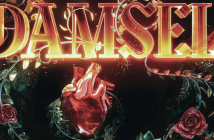 We love sharing peeks at books that you’ll want to add to your to-be-read lists – and for fantasy fans, there’s no doubting that Jenna Nelson’s The Snow Globe should be on your radar!
We love sharing peeks at books that you’ll want to add to your to-be-read lists – and for fantasy fans, there’s no doubting that Jenna Nelson’s The Snow Globe should be on your radar!
The first book in the Winterhaven Chronicles follows Sondrine Renfrew, who works at Cimmerian’s Curio Emporium by day and weaves elements into creatures by night. When her aunt decides to engage her to a complete stranger, Sondrine escapes into the rabbit hole of Winterhaven, the world inside a snow globe she bought on a whim from a stranger.
But her arrival was no accident – the man who sold her the snow globe is a bounty hunter employed by the Winterhaven’s king, and the war raging in Winterhaven needs Sondrine’s elemental gifts to save them.
The Snow Globe is available now. Read The Snow Globe excerpt below, and let us know what you think in the comments!
CHAPTER ONE
August 22, 1875
London, England
LAVENDER AND ANISE simmer through the shadows of Cimmerian’s Curio Emporium, a hint of black pepper today—calendula perhaps—underneath. Mahogany shelves stretch floor to ceiling along the wall behind the counter, each one bursting with remedies for various ailments and abnormalities. On the top shelf, a line of glass jars holds medicinal powders in a rainbow of hues. Metal canisters below house fibrous roots, dried herbs, and exotic spices from rainforests halfway around the world. And inside the oval glass cabinet, right in the center, are long-necked bottles and oblong tins containing healing salves, oils, creams, and liniments, all emblazoned with Cimmerian’s distinctive seal.
We are quite low on stomach bitters, and I make a note of it. There is no point in watching a closed emporium unless it’s to be sure the creeping vine stays within the confines of its box or to keep the serpent’s tongue from making idle conversation. I’m being droll, of course. But here I am taking inventory, a most menial task, because Aunt Henrietta does not trust me to be alone with the customers while she’s gone.
As of late, she’s been disappearing for an hour here, three there, without telling me where she is going or what she is doing. In the end, I don’t care much. We get on well enough, but other than blood ties, there’s not much else between us.
Five knocks at the front door, on time per usual. It’s the ice merchant and his wife. “Good day, Mr. and Mrs. Gatti,” I say, letting them in to shouts of street vendors hawking their wares in the oppressive heat. A handkerchief goes to my nose. The smell of sewage is especially assaulting today. “Put the ice in the scullery, please, the customary place.”
This is what I do, day in, day out. Take care of things. We don’t have help because I am the help. My primary education is finished, and now I’m a servant. A bored servant. Much as I love the emporium, if there is nothing more to this life than managing merchants, cataloguing hair tonics, or embroidering ridiculous flower patterns in the interim, I may well go insane.
I make polite small talk with Mrs. Gatti while her husband lumbers back and forth around the bookshelves and étagères with the blocks of ice. She always hovers near the door. This place scares her, I think. For all I know, I scare her too; she would not be the first person to be afraid of me.
“Please—set the last piece on the counter,” I say on impulse.
Mr. Gatti’s heavy boots shuffle to a stop. By the tilt of his head, he seems perplexed by the odd request but does what I ask. We are loyal customers, although it matters not. Provided that he gets our money, he will put the ice on my head if I so desire. Mrs. Gatti collects payment the moment her husband finishes, and I tell them I look forward to doing it all again next week, same time. I try to say it with enthusiasm. I fail miserably.
Behind the counter, I take a seat on the high wooden stool. Water bleeds from the large block of ice, pools below in a growing puddle. Given the heat, it won’t last long. What to do with it, I’m not quite sure, but I need to practice; it’s been ages. My performances, another thing I do to bide my time, are rote and uninspired, a consequence of my boredom with it all. Too often I default to fire, which comes naturally. Water and air are passable, but earth, my least favorite element, is dismal, and I’ve all but abandoned it.
The city noise outside, the tradesmen and organ grinders and horse carriages hurrying past, fade to a muted amalgamation of sound as I concentrate on the ice before me. Candlelight falls across the surface, vapor whispers around the edges. A familiar energy pulses through me as the straight lines soften the cube into a cylindrical shape.
Wide vertical grooves burrow through the surface, leaving slivers of fractured ice in their wakes. On one side, they spiral into a deep burl. Pieces on top thin into long needles, twining left and right and straight up to form an icy tangle of gnarled branches.
Other than the sound of shifting gears from the Aeriscloque—the timepiece around my neck—the room falls silent. A cocoon sprouts from one of the branches where I touch it with my fingertip. A bit of a cheat, but who’s counting? I study the tree. It’s a bit lopsided and sad, the branches on one side longer than on the other, but not bad for using my hands only once; my mental capabilities are improving.
The pod twitches of its own accord.
I straighten and stare. I wait for something more to transpire. But after thirty seconds on the Aeriscloque tick by and nothing else comes to pass, I shrug the moment off; it must have been a flicker of the candle’s flame against the ice. While I ponder what else might be added to the tree—leaves or fruit or budding flowers of some sort—a lengthwise crack travels up the middle of the pod.
That was no trick of light.
When sixty full ticks go by with no other movement, I fight off the temptation to use my hands, instead concentrating with such force a white hot pain flashes through my eyes and stabs at my temples.
The head of a butterfly pokes through the pod’s opening; a set of feelers test the air. I gasp at the incredible sight, biting away the pain. My intention was to create an ordinary moth, most definitely not a live one. With tremendous effort, the butterfly frees itself from the cocoon but still clings to it. One frosted wing unfolds; the other follows, flapping once, then again, over and over until the wings beat back and forth in a silvery blur. When water begins to drip from them, I push the candle farther away.
“Fly, beautiful creature. Take one pass around the shop and return to me.” My sense of awe is so strong, so full of disbelief, my command comes out in a whisper. The delicate butterfly rises into the air and hovers for a moment before my eyes, wings all aflutter. Three strident knocks at the emporium’s front door break my concentration. I reach out to catch the butterfly, to save it from an untimely death, but it falls to the countertop and shatters into irreparable pieces.
Blast. I stare glumly at the pile of ice. What had just been a real, breathing insect mere seconds ago can now be used to chill the haddock in the icebox. The stab of disappointment feels sharp as the ice shards that I sweep into the dustbin. Creating a living creature in any fashion is unprecedented. It also causes searing headaches, apparently, but at least it’s fading.
“Be right there,” I call out as I pin a long, inky curl tipped in fuchsia back in my chignon to hide it. Even when I snip the ends, they grow right back, pinker and brighter than ever.
Bright midday sun devours the shadows inside the shop when I lift the door’s carnelian, tasseled shade. A formidable figure stands outside, unmoving. The sunlight hinders my vision, but from the lines I can make out, it appears to be a man in a brown leather cloak. Aside from his strong jaw, the long folds of a hood obstruct his face.
Through the glass, I say, “I’m sorry, sir, we’re closed.” I indicate the sign on the door to reiterate my point.
“It says ‘Don’t be dour, we shall return on the hour.’ You’ve come back early, have you not?”
He might be my age, but with his face hidden beneath the hood, it’s too hard to tell. “My aunt had to run an errand. She’ll return in”— I check the timepiece around my neck— “three- quarters of an hour. Please try us then.” As I let the shade fall back into place, more knocking ensues. Is he daft? His persistence annoys me, and I peer around the shade’s scalloped edge in hopes of remaining unseen.
The stranger continues our conversation as if knowing I’m still there, listening. “Please,” he says. “It’s stifling out here, and I’m in desperate need of medicinal herbs. I’ve a train to catch at Paddington and little time to waste.”
Though it’s not particularly cool inside the shop, the shuttered windows and oscillating blades embedded in the walls keep things tolerable. I can hear my aunt now, abrasive tone and all, prattling on and on in an endless tirade for allowing a patron inside, especially one of the male persuasion. But I can never refuse someone in need of medicine. And more importantly, I can never refuse the opportunity to aggravate my aunt. “Very well. Do come in,” I say.
The copper bell strikes the glass, and a flux of rancid heat ushers the stranger inside. I close the door against the bedlam of fishmongers and ginger beer sellers but decide against locking it. Heavy footsteps sound against the wooden floorboards as the cloaked man follows me through the shop.
“Such horrid weather out there, wouldn’t you agree?” I say once I’m behind the counter. “From what I’ve heard, we’re in for a dry spell for the next—”
“Enough of the pleasantries. Someone, a friend, has been injured. I need something to heal an open wound and prevent infection.”
His curt tone unnerves me. “As I mentioned, my aunt has stepped out. She is the shop’s sole proprietor, in charge of all sales. You will have to wait until she returns. It won’t be long.”
“As I mentioned, I am pressed for time.” His voice is quiet but firm.
And rude. Aside from his impolite demeanor, it is always proper to remove one’s hat—or hood, in this instance—in front of a lady. Moreover, it would be helpful in case I need to describe him to the authorities. Yet I maintain my composure. “A poultice of clove oil, shepherd’s purse, and three stems of yarrow should work,” I say.
The stranger nods, conceding. His nails grind the countertop like he’s warding off some sort of pain. I’m certain it is he who needs the medicine, not his so-called friend, but it’s not my place to say, so I climb up the latched ladder and roll along, gathering the requisite ingredients into my apron. The ladder squeaks in protest, desperate for oil.
Both the shepherd’s purse and yarrow are placed into the mortar, then ground into a fine powder with the pestle. Twelve drops of clove oil are added one by one, to thicken the mixture to the perfect consistency. With a narrow jade spatula, I scrape the paste into a small tin and snap the lid shut.
“Wash the wound daily with soap and water,” I say. “Place a dollop of the poultice over it when rising and before bed. Two pounds, please.”
“Two pounds for medicinal herbs?” He spits the words. “Do you mistake me for royalty?”
I want to burst out laughing, to assure him he would never be mistaken for even a lowly knight. “It’s a fair price,” I say in an even tone. “True, you’ll get it a touch cheaper down the road at Whittock’s Apothecary, but their ingredients aren’t as fresh, guaranteed.”
He’s silent for a moment, his finger tapping the countertop in contemplation. From beneath his cloak, he removes a satchel, sets it on the counter, and opens the flap. “You’re a vendor of antiques as well, aye?” He reaches in with both hands and takes out a large object wrapped in navy blue silk. “I’ll have to sell something in order to pay you.”
According to Dante, there are nine circles of Hell. Should I have to suffer through each and every one of them, I still would not buy his wares in exchange for the medicine. While I contemplate how to phrase this in a more delicate manner, he unravels the swath of fabric little by little until the last piece falls away, revealing a snow globe.
My annoyance fades. Like him, I need both hands to pick up the globe—not surprising given the size of it along with the impressive stone base. A castle of sandstone sits beneath the curved glass, with indigo turrets reaching for the sky. It stands sentry on a snow-blanketed hill over the brick cottages below, all lining either side of a twisting cobblestone road. An aquamarine sea with sailing ships hems the entire village.
“Can you tell me the history of this piece?” I ask, careful to appear disinterested, a tactic I learned from my aunt. “Where did it come from?” I turn the globe in my hand. A mountain range circles the background; a forest nestles the foot.
“For thousands of years, the snow globe has been passed down by kings and queens and their sons and daughters,” he answers. “An heirloom of sorts.”
Not one drop of sovereign blood is flowing through the stranger’s veins, this much is clear. He must be a thief, the snow globe likely stolen. “Kings and queens of where?” I ask. “Here in England?”
“Winterhaven.”
Despite the fact that until this moment, I have never before heard of Winterhaven, I nod as if I know it well. Geography has always been a bleak subject. I get Bulgaria and Bosnia mixed up every time. “In all honesty, I have no idea how much my aunt would charge to acquire this. If it’s as ancient as you say, then it’s quite rare.”
“Ten pounds is a fair price.”
His eyes are hidden so I can’t read them to know if they betray the truth, but ten pounds is a small fortune. My aunt will have my head on a silver platter, decorated with lemon slices for good measure. “Five pounds,” I counter.
“Nine.”
“Six.”
“Eight,” he growls. “Fare for the train is still needed.”
I set the snow globe down and push it back in his direction. “I’m afraid you’ve mistaken me for a fool. Unless this can do something fantastical like cure gout, my final offer stands at six pounds.”
The stranger exhales a bothered sigh, then points to the melting tree of ice. “You’re Sondrine Renfrew, they tell me.”
He knows my name? So taken aback am I, words escape me, and I swim in the awkward silence, unsure of how to answer.
“Did you create this ice sculpture?” he presses. “How does one craft something with such detail—from ice, no less?”
His query prods a raw and aching nerve. Why I alone can make these things when no one else can remains an unanswered question that haunts me on a near-daily basis.
When I was five years old, Aunt Henrietta was cooking something over the stove and warned me not to touch the fire. Of course I disobeyed. But the flames didn’t burn my skin. They caused no pain, either. I drew the fire outward like a piece of yarn and spun it into a cat’s cradle. Henrietta was rendered speechless, and the sheer magnitude of that alone was almost as astonishing as discovering my talent.
I smile coyly. “An illusionist never reveals her secrets.”
“This tree is no magic act.” His fingers trace the graceful branches, slick with water. “Seems real enough to me. Rumor has it you can weave fire, water, and air into objects such as this one. They say you’re an Elementalist.”
Now I want him to leave. His presence is rattling me. Determined not to show it, I pick up the tree with both hands. “Now you see it”—I drop it into the trash bin, where it lands with a resounding thud—“now you don’t.” I offer up a smug smile. “See? An illusion. And I’m not sure who they are, but rumors are fueled by gossip and half-truths. In any case, it’s none of your busin—concern.”
“You’d be surprised,” he says.
The patron is always right’ mantra can take a flying leap out the nearest window. “What in the queen’s name is that supposed to mean?” This time I let my disdain ride through.
He indicates the snow globe. “Seven pounds, you said?”
“I said nothing of the sort! Six pounds, enough for the medicine and train fare. Take it or leave it.”
The stranger hesitates. His fingers drum against the countertop. “Sold.”




